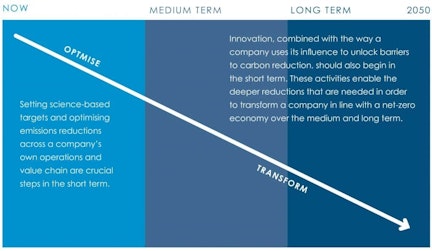Perspectives

Across the corporate world, the level of knowledge, understanding and action on climate change is extremely varied. Leading organisations have made far-sighted commitments to tackling this global issue – at the start of 2020, over 1,000 companies with a combined market capitalisation of many trillions of dollars had either already set, or were committed to setting, science-based targets for carbon emission reductions.
However, this still leaves a huge number of businesses that have yet to adopt sufficiently ambitious plans. Even among the world’s 200 largest companies, a third don’t fully disclose their greenhouse gas emissions, according to a recent study by Arabesque S-Ray. Furthermore, a United Nations Global Compact and Accenture study of over 1,000 chief executives has found that less than half (48%) are integrating sustainability into their business operations.
We shouldn’t be surprised by this. In 2015, our research found that the majority of businesses were living in dual realities: recognising and accepting the risks and opportunities of an environmentally sustainable future but continuing to focus on the short-term, with no clear vision as to how they would transition from one to the other. Yet, many also considered themselves ‘top of the class’ in this field; of those who claimed to be aware of how they compare with competitors on environmental sustainability, half saw themselves as leaders.
In our experience, most organisations are quite a long way from demonstrating true ‘leadership’ on climate change when it comes to their strategic and operational responses. Indeed, many struggle to achieve a full and detailed grasp of the risks and opportunities, a complete understanding of whole value chain emissions, and good-quality reporting – let alone producing a comprehensive and costed implementation plan to support their commitments.
True leadership needs to be top down, but climate change is not dominating board agendas. A recent global survey of chairs and non-executive directors found that more than half of respondents had spent zero hours discussing environmental impact.
True leadership needs to be top down, but climate change is not dominating board agendas
Even in businesses that are working hard to deliver approved science-based targets, more needs to be done if these companies are to be considered true trailblazers. Science-based targets commit companies to action over the next five to 15 years and are effective in ensuring that boards address carbon emissions now, rather than putting action off for future leaders to tackle. However, it also means that many organisations are focused on the shorter-term changes that optimise their existing operations.
If we’re going to achieve net zero economies and align with a 1.50°C trajectory, then businesses will absolutely have to tackle the ‘harder to fix’ aspects of their activities. Organisations need to be thinking now about how they’re going to achieve the much deeper transformative changes to unlock the carbon emissions reductions that will be vital in the future.
This will clearly require businesses to look beyond their own operations and value chains. Companies should be considering how the use of their products and services can enable the avoidance of emissions and how they can influence other organisations to go on the same journey of climate sustainability. They must also be investing in the innovations that will be necessary to deliver legitimate net zero scenarios.
What’s also becoming apparent is that, as we come to better understand the actions that are needed to mitigate the worst impacts of climate change, companies that were once pacesetters are now having to tackle fresh challenges in order to maintain this position.

Achieving net zero – the corporate route to climate leadership
At the Carbon Trust, we’re helping some ambitious organisations establish strategies and road maps to true climate leadership via our Climate Leadership Framework. We review a company’s current performance on climate change using a scorecard assessment before working with them to create a bespoke net zero roadmap that can be embedded in strategic plans. Working with companies such as Sky, Pearson, Quorn and SGN, we’ve found this to be a powerful internal tool, helping those who are already championing action on climate change to influence senior colleagues and elevate actions within their organisation.
So, it’s time for a reality check in the corporate world. Climate change is an urgent and current priority that needs board-level attention and we need to see ever-more progressive action from companies if they’re to lead the way.







